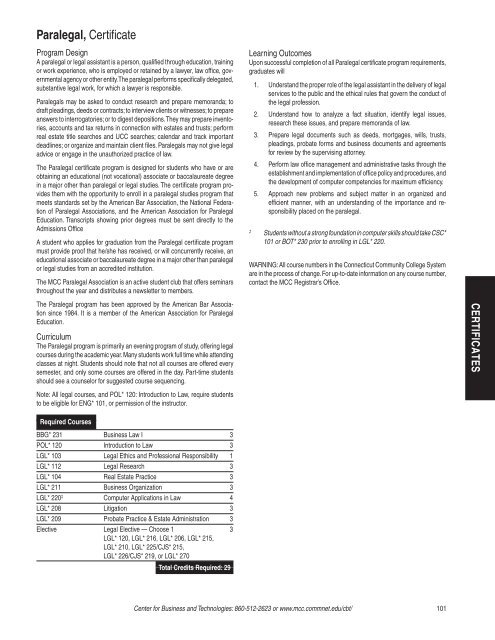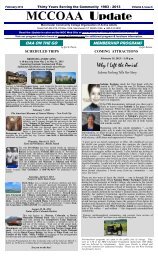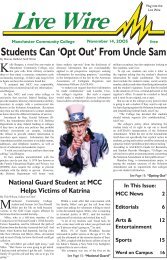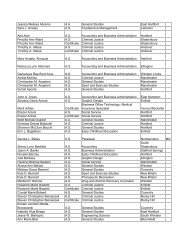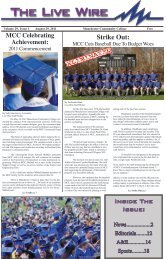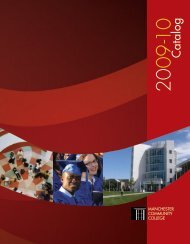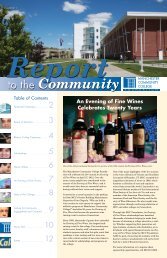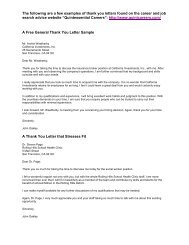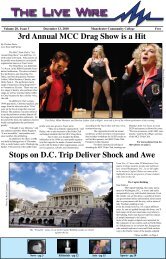Liberal Arts and Science - Manchester Community College ...
Liberal Arts and Science - Manchester Community College ...
Liberal Arts and Science - Manchester Community College ...
You also want an ePaper? Increase the reach of your titles
YUMPU automatically turns print PDFs into web optimized ePapers that Google loves.
Paralegal, Certificate<br />
Program Design<br />
A paralegal or legal assistant is a person, qualified through education, training<br />
or work experience, who is employed or retained by a lawyer, law office, governmental<br />
agency or other entity. The paralegal performs specifically delegated,<br />
substantive legal work, for which a lawyer is responsible.<br />
Paralegals may be asked to conduct research <strong>and</strong> prepare memor<strong>and</strong>a; to<br />
draft pleadings, deeds or contracts; to interview clients or witnesses; to prepare<br />
answers to interrogatories; or to digest depositions. They may prepare inventories,<br />
accounts <strong>and</strong> tax returns in connection with estates <strong>and</strong> trusts; perform<br />
real estate title searches <strong>and</strong> UCC searches; calendar <strong>and</strong> track important<br />
deadlines; or organize <strong>and</strong> maintain client files. Paralegals may not give legal<br />
advice or engage in the unauthorized practice of law.<br />
The Paralegal certificate program is designed for students who have or are<br />
obtaining an educational (not vocational) associate or baccalaureate degree<br />
in a major other than paralegal or legal studies. The certificate program provides<br />
them with the opportunity to enroll in a paralegal studies program that<br />
meets st<strong>and</strong>ards set by the American Bar Association, the National Federation<br />
of Paralegal Associations, <strong>and</strong> the American Association for Paralegal<br />
Education. Transcripts showing prior degrees must be sent directly to the<br />
Admissions Office<br />
A student who applies for graduation from the Paralegal certificate program<br />
must provide proof that he/she has received, or will concurrently receive, an<br />
educational associate or baccalaureate degree in a major other than paralegal<br />
or legal studies from an accredited institution.<br />
The MCC Paralegal Association is an active student club that offers seminars<br />
throughout the year <strong>and</strong> distributes a newsletter to members.<br />
The Paralegal program has been approved by the American Bar Association<br />
since 1984. It is a member of the American Association for Paralegal<br />
Education.<br />
Curriculum<br />
The Paralegal program is primarily an evening program of study, offering legal<br />
courses during the academic year. Many students work full time while attending<br />
classes at night. Students should note that not all courses are offered every<br />
semester, <strong>and</strong> only some courses are offered in the day. Part-time students<br />
should see a counselor for suggested course sequencing.<br />
Note: All legal courses, <strong>and</strong> POL* 120: Introduction to Law, require students<br />
to be eligible for ENG* 101, or permission of the instructor.<br />
Required Courses<br />
BBG* 231 Business Law I 3<br />
POL* 120 Introduction to Law 3<br />
LGL* 103 Legal Ethics <strong>and</strong> Professional Responsibility 1<br />
LGL* 112 Legal Research 3<br />
LGL* 104 Real Estate Practice 3<br />
LGL* 211 Business Organization 3<br />
LGL* 220 ‡ Computer Applications in Law 4<br />
LGL* 208 Litigation 3<br />
LGL* 209 Probate Practice & Estate Administration 3<br />
Elective Legal Elective — Choose 1 3<br />
LGL* 120, LGL* 216, LGL* 206, LGL* 215,<br />
LGL* 210, LGL* 225/CJS* 215,<br />
LGL* 226/CJS* 219, or LGL* 270<br />
Total Credits Required: 29<br />
Learning Outcomes<br />
Upon successful completion of all Paralegal certificate program requirements,<br />
graduates will<br />
1. Underst<strong>and</strong> the proper role of the legal assistant in the delivery of legal<br />
services to the public <strong>and</strong> the ethical rules that govern the conduct of<br />
the legal profession.<br />
2. Underst<strong>and</strong> how to analyze a fact situation, identify legal issues,<br />
research these issues, <strong>and</strong> prepare memor<strong>and</strong>a of law.<br />
3. Prepare legal documents such as deeds, mortgages, wills, trusts,<br />
pleadings, probate forms <strong>and</strong> business documents <strong>and</strong> agreements<br />
for review by the supervising attorney.<br />
4. Perform law office management <strong>and</strong> administrative tasks through the<br />
establishment <strong>and</strong> implementation of office policy <strong>and</strong> procedures, <strong>and</strong><br />
the development of computer competencies for maximum efficiency.<br />
5. Approach new problems <strong>and</strong> subject matter in an organized <strong>and</strong><br />
efficient manner, with an underst<strong>and</strong>ing of the importance <strong>and</strong> responsibility<br />
placed on the paralegal.<br />
‡ Students without a strong foundation in computer skills should take CSC*<br />
101 or BOT* 230 prior to enrolling in LGL* 220.<br />
WARNING: All course numbers in the Connecticut <strong>Community</strong> <strong>College</strong> System<br />
are in the process of change. For up-to-date information on any course number,<br />
contact the MCC Registrar’s Office.<br />
Center for Business <strong>and</strong> Technologies: 860-512-2623 or www.mcc.commnet.edu/cbt/<br />
101<br />
CERTIFICATES


